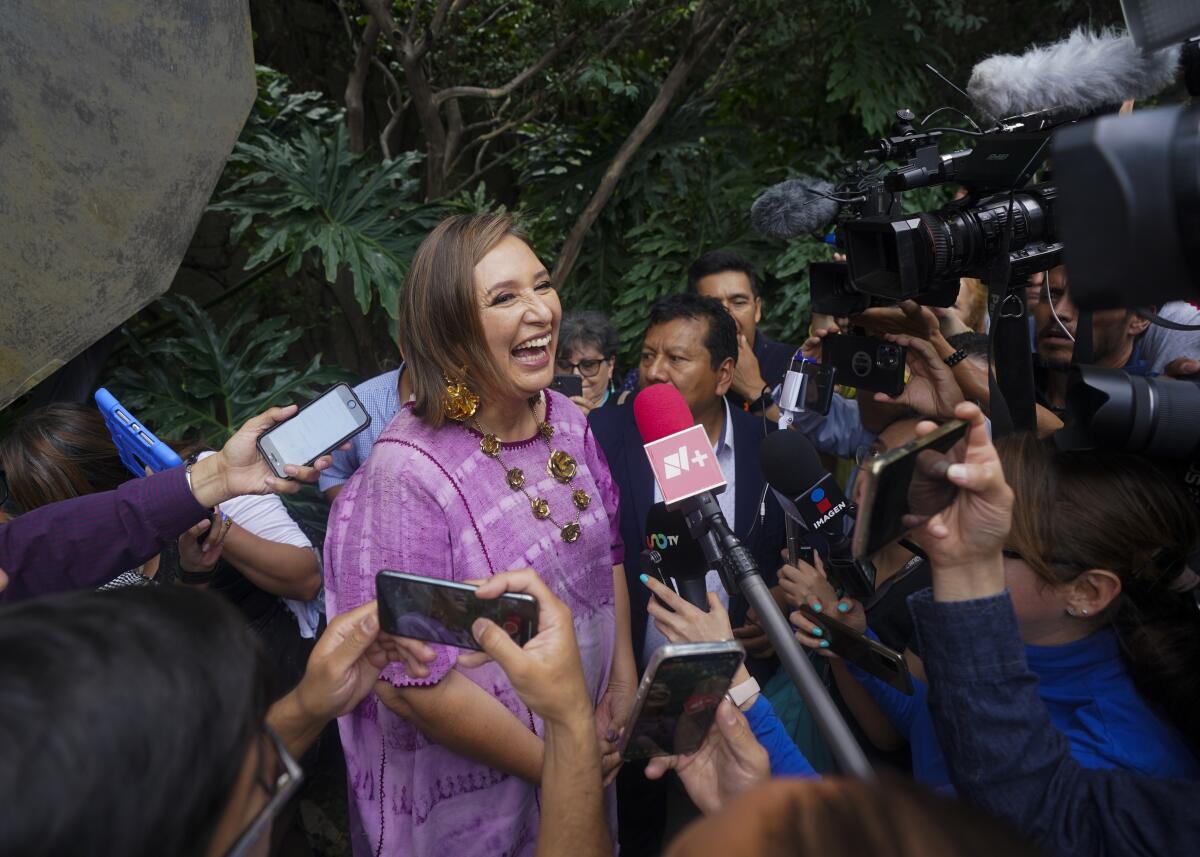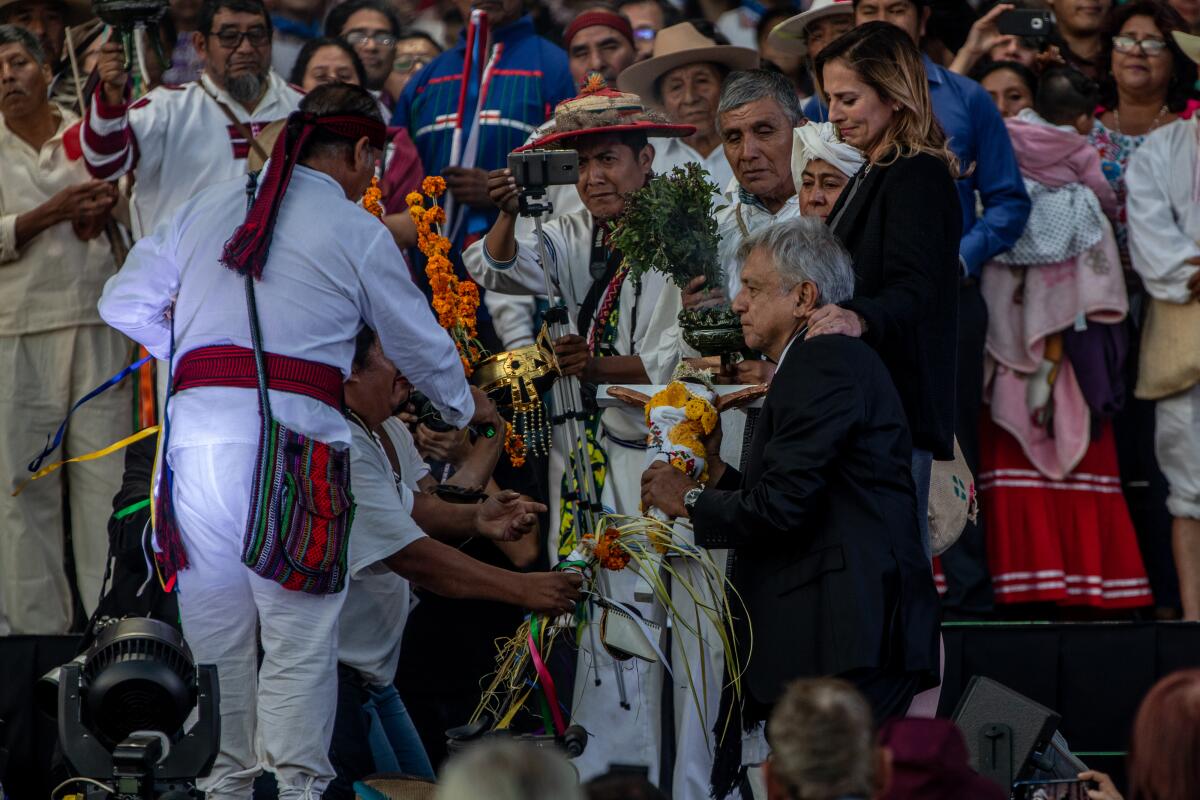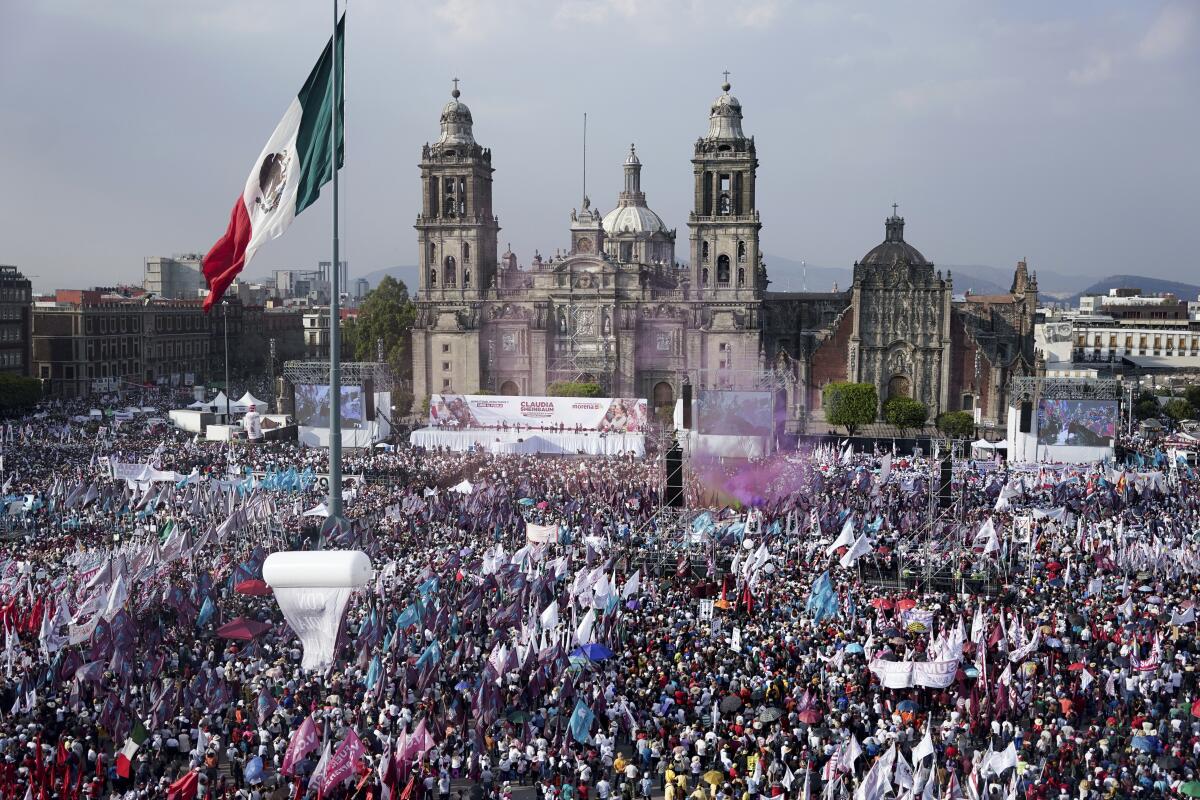Mexicans voted Sunday in an election set to give the nation its first female president — a groundbreaking development in a country where women could not cast ballots for president until 1954.
“Never in my entire life did I imagine that a woman would be president of my country,” said Cristina Navarrete Santillán, 76, who voted in the southern Mexico City neighborhood of Tlalpan alongside her two daughters and two granddaughters. “I am glad to be alive to see it.”
Navarrete backed former Mexico City Mayor Claudia Sheinbaum, a candidate hand-picked by outgoing President Andrés Manuel López Obrador and the clear front-runner in the race.
The results of the election were not expected to be released until Sunday night. Polls ahead of the vote showed Sheinbaum with a large lead over Xóchitl Gálvez Ruiz, a senator from a center-right bloc of parties united largely in their opposition to López Obrador. Trailing in third behind the female candidates was Jorge Álvarez Máynez, a member of Congress.

Candidate Xóchitl Gálvez Ruiz at a campaign event last year.
(Fernando Llano / Associated Press)
The election, one of the most divisive in recent memory, was widely viewed as a referendum on López Obrador, a leftist populist who has lifted millions out of poverty while bending democratic norms and failing to curb widespread gang violence.
Many of those who voted for Sheinbaum on Sunday said they did so in hopes that she will advance the president’s trademark anti-poverty policies, particularly his government’s welfare payments to students and elderly people.
“She is going to continue with all the help that the president has given us,” said Rosa Maria Velazco, a 52-year-old teacher. “She will continue to support the poorest.”
Those who voted for Gálvez, on the other hand, largely said they were inspired not so much by her profile or promised policies, but because she had promised to change course away from López Obrador.

Andrés Manuel López Obrador, Mexico’s president, kneels during an Indigenous ceremony during his inauguration in 2018.
( Bloomberg / Getty Images)
“I’m very angry at this government,” said Julieta Jujnovsky, 45, a professor of biology who cast her ballot in the upscale Mexico City enclave of Condesa.
Jujnovsky said it is not so much the president’s leftist ideology that she opposes, but rather his style of governing.
“He doesn’t want any opposition,” said Jujnovsky, who described the president’s efforts to reform the Supreme Court, slash the number of seats in Mexico’s legislature and overhaul the country’s elections institute as part of a “deterioration” of Mexico’s democracy.
“Democracy depends on counterweights and listening to the other side,” she said.
Sunday’s historic election is Mexico’s largest ever, with voters also choosing a new Congress, eight state governors, the Mexico City mayor and some 20,000 local office-holders nationwide. In some parts of the country, voters lined up before dawn.
That was the case in the middle-class neighborhood of San Andres Totoltepec, where Sheinbaum, an environmental engineer by training, was reared and where she voted early Sunday.
As the candidate took her place in a line of about 100 people to cast her ballot, the crowd broke out in chants of “Presidenta!”

Supporters of presidential candidate Claudia Sheinbaum crowd the Zocalo during her opening campaign rally in Mexico City on March 1.
(Aurea Del Rosario / Associated Press)
Should Sheinbaum triumph, as is widely expected, many will be looking at her final margin of victory for clues about the breadth of her support. Final polling showed Sheinbaum leading Gálvez by 14 to more than 25 points.
Turnout in Sunday’s election appeared to be high. Voters reported long waits at election sites around the country.
In the United States, which is home to nearly 11 million people born in Mexico, migrants who in the past were able only to vote in Mexican elections by mail could vote for the first time in person at consulates.
Long lines of voters stretched for blocks in cities that included Chicago and Orlando, Fla. In Los Angeles, the line at the Mexican Consulate in MacArthur Park wrapped around the block twice, with some people arriving as early as 4 a.m.
Voters draped in Mexican flags waited patiently as mariachi music blasted.
Laura Torres, who arrived with a group from Oxnard, said she had waited six hours to vote and would wait another six if necessary. The group planned to vote for Sheinbaum.
López Obrador won in a landslide six years ago vowing to finally put the “poor first” in a country that he said had been hijacked by a corrupt and conservative elite. López Obrador’s approval rating still tops 60%, making him one of the most popular leaders in Latin America.
When he departs office in October, he will leave his successor with a strong economy that has been bolstered by the relocation of foreign firms from Asia and elsewhere to Mexico. The Mexican peso has been among the world’s strongest currencies.
But the next president will also inherit a number of crises, including dire water shortages, a struggling healthcare system, stubborn inequality and violence from criminal gangs and cartels so severe that the U.S. State Department warns its citizens not to travel to many Mexican states.
López Obrador’s controversial “hugs not bullets” strategy — prioritizing social programs for the young over direct confrontations with cartels — has failed to stem the country’s violence, although homicides have fallen some during the last six years. Security is by far Mexicans’ main concern, polls show.
While voters were fiercely split on the issues at the heart of the race, many on both sides of the political divide were elated to have the chance to vote for a woman.
Fewer than a third of the countries in the United Nations have ever had a female leader, according to a Pew Research Center analysis from last year.
In Mexico, where a 2019 constitutional reform set quotas requiring gender parity in all elected posts at the federal, state and municipal levels, women now account for about half the Congress.
Rosa Maria Beltrán, a 39-year-old dentist who voted for Sheinbaum, said she was proud of her country.
“Tell the people in the United States that in Mexico we are going to have a female president before them,” she said.
Anthony De Leon and Dania Maxwell in Los Angeles and Cecilia Sánchez Vidal in Mexico City contributed to this report.

Post a Comment